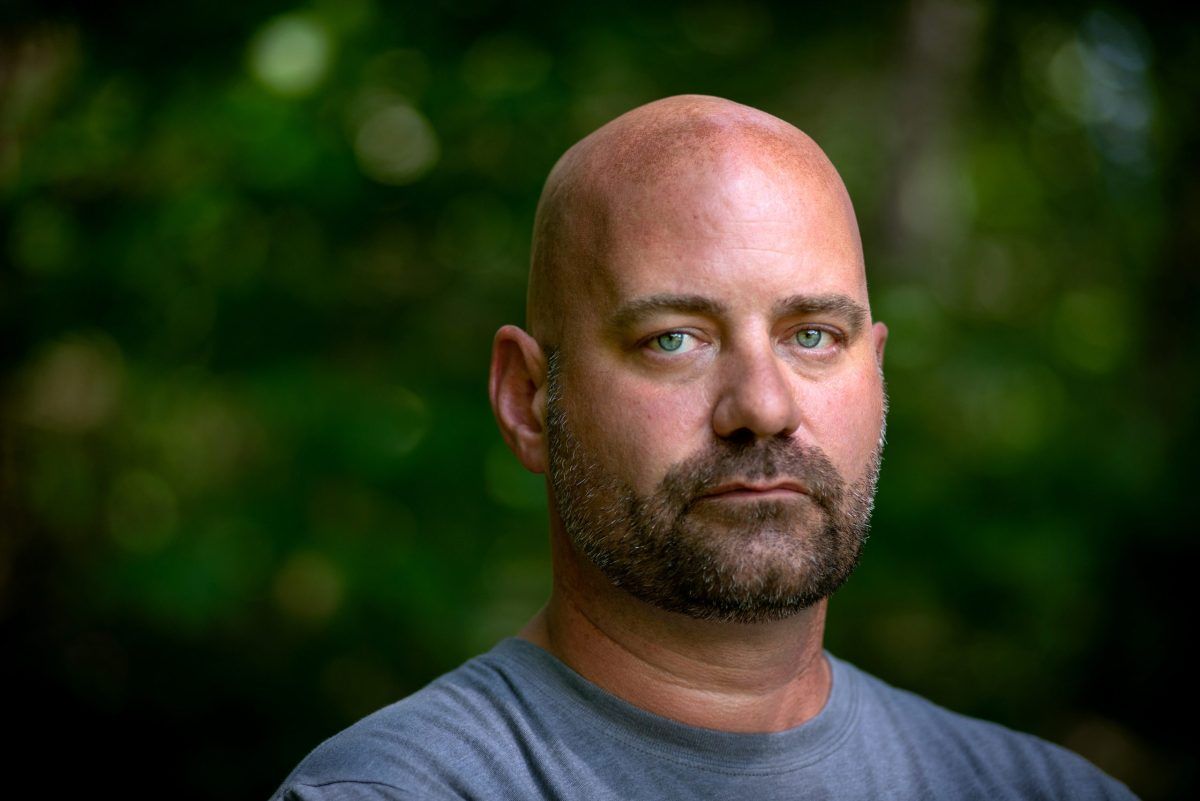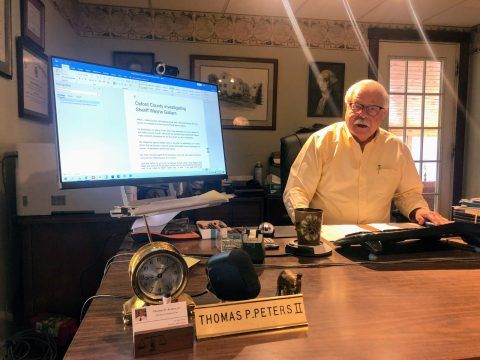Editor’s note: This is the first story in a series about how county law enforcement officers in Maine escape accountability. The series was supported by the Pulitzer Center.
The day was cool but sunny, as thousands of people wandered the Fryeburg Fair on Oct. 3, 2017. It was a safe work environment for then-Deputy Christina Sugars, who sat in a golf cart. But the feeling of calm evaporated in a few seconds — not because of rowdy fairgoers or errant livestock, but because she saw her boss.
Wayne Gallant, then the Oxford County sheriff, approached her, placed his hand over her mouth and kissed his hand.
The encounter left Sugars embarrassed and stunned, she wrote in a complaint to the Maine Human Rights Commission, especially when Gallant later texted to tell her that, in his mind, he was really kissing her.
Earlier that year, Gallant sent nude photos of himself to another employee, Lt. Brian Landis, and Landis’ girlfriend, and asked them to come to his house for sex. At the same time, Gallant messaged Landis’ estranged wife to invite her to come stay with him, according to testimony from someone who saw the messages.
Years before, in 2014, Gallant messaged a female officer at another law enforcement agency in Oxford County over Facebook. He talked about how he had “naughty thoughts,” and could be “easily tempted” or “ordered to weaken.” He sent the female officer at least nine erotic images, including close-ups of his erect penis apparently in the shower, protruding from his uniform at work and encircled by handcuffs.
No one reported him for years because he was the sheriff, the female officer said. “He’s untouchable. What’s the point?”
She was largely right. When backed into a corner, one employee, Landis, did report Gallant to the county, which then learned it had no power to punish a sheriff.
If he had been a rank-and-file police officer, Gallant likely would have been placed on administrative leave, investigated and potentially fired. If the agency overseeing law enforcement in Maine disciplined officers for violations of the Maine Human Rights Act, rather than mostly crimes, it’s possible it would have pulled Gallant’s badge. If Gallant had been a doctor, his colleagues would have been legally obligated to report him to the state licensing board, and he may have lost his license.
But holes in the system of oversight for sheriffs allow them to escape accountability in ways few others in positions of power can.
Unlike police chiefs who are hired and fired by municipalities, sheriffs are elected by voters, and, under the Maine Constitution, only a governor can remove them. But the governor’s power is also limited. There is no legal mechanism for a governor to put a sheriff on leave during an investigation.
So when two investigations, one internal and the other criminal, commenced into Gallant, who was also president of the Maine Sheriffs’ Association, he continued to work for a month. It allowed him to allegedly destroy many erotic images on his devices, according to testimony in court.
Gallant resigned in December 2017, after 11 years as sheriff, but there was never a public reckoning of what happened under his management and the aftermath when he left.
So the Bangor Daily News compiled an account of Gallant’s actions and others’ inactions by reading thousands of pages of county emails, settlement agreements and court documents; obtaining case files from the Maine Human Rights Commission that had not previously been made public; and interviewing officials and officers in Oxford County.
The investigation, begun last year, revealed evidence that Gallant sent graphic pictures of himself or suggestive messages to a minimum of five people: two employees, one of whom was facing criminal charges; two members of the community, one of whom had been a prisoner; and the officer at the other law enforcement agency.
But Gallant escaped accountability in a profession that exists to uphold the law. He kept his certification as a law enforcement officer until it expired in 2019 because the state’s credentialing agency does not take up cases of alleged sexual harassment. When he stepped down as sheriff, he was still eligible for a pension. He has not been charged with a crime.
County taxpayers were ultimately responsible and paid more than $170,000 — the equivalent of four deputy salaries — in investigation costs and settlement fees when Landis and Sugars brought their complaints of sexual harassment to the state level. The two won some of the largest payouts to county employees in recent years, but the deals effectively bought their silence and, at least with Sugars, made her unwilling to speak publicly about her experiences for fear of the county suing her to get its settlement money back.
The lack of consequences for Gallant stirred distrust in the Oxford County Sheriff’s Office among members of the public and befuddled even county officials.
“I don’t know why charges weren’t brought against him,” said David Duguay, an Oxford County commissioner. The new sheriff is trying to restore the office’s reputation, he said, “but it’s going to be a long time before it’s restored to where it should be.”
The current sheriff, Christopher Wainwright, declined an interview but said in a statement that his office “has moved on from the regrettable events of the past.”
Through his attorney, Gallant declined to speak to the BDN.
‘It Was a Mess’
Gallant’s position afforded him something most officers don’t get when they are suspected of misconduct: time. That fact comes into focus when contrasting Gallant’s experience with what happened with one of his employees, Landis, whom Gallant allegedly propositioned after Landis’ arrest.
At 12:55 p.m. on June 28, 2017, Maine State Police served Landis with a protection from abuse order, filed by his then-wife, in Gallant’s office, in front of Gallant. Two hours later, after state police were briefed on a trooper’s interview with Landis’ wife, they arrested Landis for domestic violence terrorizing for allegedly threatening to kill his wife during an argument over the phone two days prior, according to the police report. Landis’ removal from his position of power was swift.
The evidence against Landis was not clearly articulated in the redacted police report or, later, in court. The police report detailed no recordings — just the word of Landis’ then-wife and the recollections of her friend who said he overheard the couple’s phone call.
Landis’ wife said her husband had threatened to kill both her and anyone who supported her, but the friend recounted only hearing Landis threaten to kill “everyone who had helped her.” (The prosecutor declined to discuss available evidence and said the case had been reviewed by multiple lawyers and handled by the state police given Landis’ position in law enforcement “to ensure a fair process.” Landis’ then-wife did not respond to a request for comment.)
Despite the witness’ different recollection, Landis was charged with two counts of domestic violence terrorizing and brought to Oxford County Jail, where he bailed out. Now, he found himself in two disparate worlds. He was still an employee of the sheriff’s office, albeit on unpaid administrative leave. He was also a prisoner out on bail, bound by conditions enforceable by his former colleagues.
This is when Gallant, who was responsible for those officers, apparently decided to proposition Landis. Four days after his arrest, Gallant solicited oral sex from Landis and said he wanted Landis’ girlfriend, Shauna Cummings, to watch, according to testimony under oath from Wainwright, who saw the Facebook messages from Gallant. Both Landis and Cummings declined to comment.
At the time, Wainwright led the Oxford County Sheriff’s Office’s criminal investigation division and was tied into an ongoing FBI investigation into Gallant. He disclosed this knowledge during a hearing for Landis’ court case in July 2018. Today Wainwright is the sheriff of Oxford County. Why, precisely, the FBI began investigating Gallant, Wainwright did not say. But one reason was “because [Landis] was out on bail from the sheriff’s facility. He was a prisoner, and the sheriff was trying to solicit sex,” Wainwright said. A spokesperson for the FBI could neither confirm nor deny the existence of an investigation.
In addition to allegedly propositioning Landis, Gallant had also apparently messaged Landis’ wife, the alleged victim of domestic violence terrorizing, to ask her to come stay with him. Wainwright described the messages as appearing to try to stoke her fear of her husband.
In the messages, sent before Landis’ arrest, Gallant told her, “‘I’m scared of [Brian Landis]. I don’t know what he’s going to do. I sleep with two guns. Come stay with me,’” Wainwright testified. It’s unlikely Gallant was afraid of Landis, however, because at the same time he was messaging Landis’ wife, he was also sending Landis and his girlfriend, Cummings, nude photos of himself and asking them to come over for sex, Wainwright said.
“There were multiple conversations going on at the same time,” Wainwright said in his 2018 testimony, before letting out a sigh.
“I’ve seen it. I mean, you’ve seen it,” Wainwright said to Landis’ attorney, Ted Dilworth, in court. (Dilworth declined to comment.) “Some of this stuff was brought up during the interview with the FBI, and you were in the room. So you’ve seen it yourself.”
Just as Gallant would soon face an internal investigation, Landis did, too. Agencies typically perform them when officers are arrested to determine an appropriate punishment apart from criminal proceedings, such as whether to fire or suspend them. But, for Landis, there was no independent oversight.
Wainwright gave Gallant the names of unbiased, outside investigators, and, in a letter, the sheriff’s office told Landis that an outside agency would investigate. But that didn’t happen. The second in command, then-Chief Deputy Hart Daley, emailed the state police to say the “Sheriff and I” would conduct the internal investigation and proceeded with it himself — slowly. With Gallant still in office, it put the sheriff in charge of the investigation into the person he was allegedly sexually harassing.
More than five months after Landis’ arrest, Daley handed off the internal investigation to the Kennebec County Sheriff’s Office. But Daley still controlled the investigator, telling him when to stop and start. On Feb. 1, 2018, the county’s human resources consultant, Annalee Rosenblatt, urged Daley in an email to continue with the investigation because it was a “bargaining chip” to get a response from Landis on the county’s settlement offer.
Soon after, the Kennebec County investigator gave up. He never produced a report because he couldn’t conduct “an adequate investigation,” Wainwright testified. “It was a mess.”
There was even less material from Daley’s supposed investigation, Wainwright said — not one scrap of paper.
In the end, no one interviewed Landis. No one finished an internal investigation. Landis waited on administrative leave without pay, apparently unwilling to resign over something he said he didn’t do.
With time, Oxford County learned more about Gallant’s involvement with Landis’ then-wife. The couple is now divorced. After Landis’ arrest, the county permitted a technology employee to help her set up surveillance cameras at her home, according to Wainwright’s testimony.
Even after he left office, Gallant sent Landis’ wife a picture of a record from her husband’s confidential personnel file, Wainwright testified. Indeed, the day before he resigned office, Gallant emailed a picture of a record in Landis’ personnel file to himself, according to records obtained by the BDN.
When people added up all the allegations against Gallant, they began to wonder why someone — the commissioners, the governor or the Maine Criminal Justice Academy, which licenses officers — didn’t have more authority to oversee sheriffs.
The female law enforcement officer at another agency in Oxford County, who had received explicit pictures from Gallant, said the academy has taken away other officers’ badges for far less. She spoke on the condition of anonymity out of fear of retribution.
In 2014, Gallant sent her an explicit photo of himself. She didn’t respond. A day later he tried again over Facebook Messenger, “Bad thoughts. I’m bad,” and received no response.
The next day he messaged her, “Naughty thoughts again …..darn,” and told her, “Deep down you like it.”
“Nope,” she said.
‘A Void in Our Statute’
Police forces in other parts of the country have multiple layers of independent oversight. On the West Coast, an Office of Police Accountability, led by a civilian director, investigates complaints about the Seattle Police Department. Then, the city’s Office of Inspector General works to ensure the overseers are doing their jobs. Plus, there’s a citizen-led police commission, a mayor who acts as a check, and the agency in charge of decertification.
That level of oversight doesn’t exist for the Oxford County Sheriff’s Office and many other, smaller forces in Maine.
At the county level, commissioners are in charge of finances, but they cannot remove a sheriff or place a sheriff on administrative leave while the sheriff is being investigated for infractions or potential crimes. They also do not have the power to discipline anyone in the sheriff’s office without the recommendation of the sheriff. Duguay, the commissioner, said Gallant didn’t even want the commissioners talking to deputies.
That leaves Maine’s overarching oversight body, the Maine Criminal Justice Academy. It has the power to certify police officers and can revoke that certification, ending officers’ careers. The academy can also suspend a certification, issue warnings, fine officers, impose probation or, when an officer’s misconduct doesn’t merit disciplinary action, write a letter of guidance.
But the academy mostly hears cases involving criminal allegations and does not review matters involving sexual harassment. There are flaws in the system. Because the academy doesn’t take up the cases, officers can resign to avoid creating a paper trail and public accountability. In the case of sheriffs, there are no local overseers who can punish them for propositioning their employees.
The academy did not bring a case against Gallant. John Rogers, the director of the academy when Gallant was in office, followed news reports about Gallant and knew there was an FBI investigation into him. But in November 2018, he told the BDN he was waiting for an outcome of the criminal investigation before considering disciplinary action, even though the academy doesn’t have to wait to begin its own proceedings since Maine law allows it to investigate and issue subpoenas.
“I don’t know what the status of that case is and if it’s concluded yet. But if it’s ever concluded, and if a crime has been alleged, then I would go after the certification of that particular sheriff. But I don’t even have a case on that,” Rogers said in 2018.
The academy didn’t open a case into Gallant because “we really thought there were bigger things going on,” said Tom Peters, a former chairman of the academy’s complaint review committee, which investigates complaints about officers and recommends disciplinary action to the full academy board. “There were cross complaints. It was a big mess out there.”
Plus, the committee often waits to investigate when there’s an alleged crime because officers won’t answer the academy’s questions, since they don’t want to prejudice their court case, Peters said.
Once Gallant resigned, Peters reasoned that Gallant was no longer a threat with a badge. Two years after Gallant left office, in 2019, there was no apparent resolution in the criminal investigation, and Gallant’s certification lapsed, meaning he didn’t have a license left to take.
By allowing officers who are fired or resign under investigation to keep their badges, the academy allows them to apply for other law enforcement jobs, whether in Maine or out of state. And while Peters said there would be value in investigating misconduct regardless of whether someone currently holds a job in law enforcement, “the reality is we can’t.”
That’s because the complaint review committee only has three unpaid members, who are “all full-time employees doing other things. We don’t have a budget or investigative team to send out,” Peters said, though he would like the academy to have expanded means.
There are some non-criminal acts that will prompt the academy to look into whether officers should continue to hold a badge. Officers are not allowed to have sex with a domestic violence victim, for instance. If they are part-time, the academy may discipline them if they work over their hours. But sexual harassment is not a reviewable, let alone decertifiable, offense.
There is also a lesser-used but broader provision in Maine law that allows the academy to discipline officers for actions that represent a “gross deviation from the standard of conduct” and violate “the standards established by the board.” If a part-time officer gets into a high-speed chase, it’s considered a “gross deviation” because the academy’s standards dictate that the activity is only allowed for full-time officers, said Rick Desjardins, the current academy director.
But the academy doesn’t consider propositioning employees and people in custody to be a “gross deviation” because it hasn’t officially set rules around sexual harassment in its minimum standards for officers.
The academy could add standards, Desjardins said, but legislation or rulemaking would be required to make the change enforceable.
“It would seem to me that if there’s a void in our statute, then it might be suggested that we propose it as legislation. I support that,” Peters said.
Penobscot County Sheriff Troy Morton said he supports the idea of certification review for sexual harassment. No one is more frustrated to see poor conduct by a few officers than those who serve daily under high standards, Morton said.
Michael Chitwood, a former chief of the Portland Police Department who worked in law enforcement for 55 years, agreed.
Officers “have an awesome responsibility. They have the power to take a life. And they have the power to be judged by their peers,” he said. “[Gallant] should have been disciplined. If it required them decertifying him, then they should have decertified him. Let him appeal it.”
But “you cannot allow that type of conduct that this sheriff was being accused of to go unpunished,” Chitwood said.
In other professions and other places, the decertifying rules are more clearcut. In Idaho, officers can be decertified for “inappropriate sexual conduct while on duty” and having “an inappropriate relationship” with those involved in investigations. Utah can decertify officers who engage in “sexual conduct while on duty.” And Florida can punish officers for sexual harassment, and trying to engage in romantic or sexual relationships with those involved with the criminal justice system.
‘Like What You See?’
Starting in 2015, Gallant was “relentless” in asking Sugars, the former deputy, for pictures of herself, she described in her complaint to the Maine Human Rights Commission, which she filed in 2018 and swore to under penalty of perjury. Unsolicited, he talked about bending her over his desk, asked her to come to his home where they could take a shower together, and spoke of the possibility of threesomes between himself and other employees, she wrote.
“Enough is enough. There needs to be change,” said Sugars, sitting on her front porch one morning before work at her new job with the Norway Police Department. When contacted, she agreed to speak only about general themes and declined to discuss details of her employment with the Oxford County Sheriff’s Office. But public documents independently obtained by the BDN illuminate her experience with Gallant.
Compared with police chiefs, “you have a sheriff with a whole county,” Sugars said, “and there’s no accountability?”
At one point a picture appeared on her phone, one of Gallant fully naked in the shower. His message read, “Like what you see?”
She was mortified but afraid of losing her job as a school resource officer for the school district based in Hiram if she reported him, she wrote in human rights commission documents. As a single mother with three daughters, she both took pride in her job and needed it to support her family.
He “was aware of that and exploited it to his benefit,” she wrote.
The second-in-command, Daley, enabled Gallant’s behavior, Sugars alleged, by “regularly” observing what Gallant said and doing nothing. Gallant also pushed complaints to Daley to investigate if she stopped texting with the sheriff or didn’t respond to his innuendos, she wrote.
In the fall of 2017, Sugars was brought before Gallant and Daley for a traffic stop complaint. From the adjoining room, she heard Daley say, “'I can’t get her. She did everything right,'” leaving her with the impression she was being “targeted,” she wrote.
Daley denied the allegations.
For Sugars, the academy’s decision to not discipline any officers, including sheriffs, for violations of the Maine Human Rights Act misses the larger point about the need for police to be credible and trustworthy.
“Why is it OK for the academy to decertify someone for OUI and not sexual harassment?” she said. “Aren’t you held to setting an example?”
The academy hasn’t gone after officers for sexual harassment because it’s not always an objective act that the agency can rule on, Rogers, the former director, said.
“Sexual harassment sometimes can be in the eye of the beholder. It’s very subjective. What’s sexual harassment to you may not be sexual harassment to someone else,” Rogers said.
At the same time, Rogers said, the employing agency should discipline its officers for sexual harassment. He has fired someone himself for sexual harassment, he said. It just hasn’t been the role of the academy to punish officers for the civil violation.
Sometimes, however, sexual harassment claims lead to even more allegations. When the BDN shared Sugars’ report of Gallant covering her mouth and kissing his hand at the Fryeburg Fair, Linda Smithers, a former chair of the academy’s complaint review committee, said it could have constituted assault, which is something the academy could review. But because the academy didn’t investigate Gallant, it didn’t know.
Others see the lack of repercussions for sexual harassment as part of a larger, cultural problem within law enforcement, where women, who are more likely to be victims of sexual harassment, are vastly outnumbered in the ranks and leadership. Only 1 percent of sheriffs nationally are women.
“Sexual harassment is a normal part of most law enforcement organizations,” said Philip Stinson, a Bowling Green State University criminologist and former New Hampshire police officer. “It’s an ‘old boy’ network. They’re just not interested in curing themselves of that.”
Sugars, who is typically outspoken, ended up leaving her job with the sheriff’s office in silence, even when parents and students began protesting online and pleading with the county in the spring of 2019 to keep her as their school resource officer. She didn’t speak out because, when Sugars reported the sheriff’s sexual harassment to the human rights commission, the county agreed to settle. It would pay her $60,000 if she dismissed her complaint and voluntarily resigned July 2, 2019. Another condition: Don’t talk.
Sugars had planned to say something about her departure in front of the county commissioners. But she stopped when the county’s attorney, Jim Pross, emailed her attorney with a warning: She would violate her settlement agreement and need to pay back the county the $60,000 if she spoke. In another email, Rosenblatt, the HR consultant, said that even if people were asking questions, Sugars needed to say she had “decided to resign.”
The 1,000 people who signed an online petition to fight for her job never knew what was happening as they lost, as one student described it, “one of the best damn things this community has in it.”
Two outside lawyers disputed the county’s assertion that Sugars had to remain silent, however, after reviewing her settlement paperwork for the BDN. None of it limited her “ability to speak publicly about the facts and events leading up to her resignation,” employment and civil rights lawyer David Webbert said.
Her fear of litigation remained. All Sugars would say for this story was that she had told the truth and would have stayed in her position if she could.
“Everybody knew how much I loved that job and those kids,” she said.
Her daughters spoke about how stressed their mother, independent and strong willed, had been during all her transitions. Sugars kept so much to herself, said one daughter, Tianna Sugars, 22. Her mom couldn’t show her frustration at work, she said, so it sometimes came out at home, and no one knew how to console her.
‘In Violation of Law … on Sexual Harassment’
Four months after Landis’ arrest, with the internal investigation in flux, Landis’ attorney hit back. It was Oct. 31, 2017, on the tail end of a historic windstorm, and the power was still out. Rosenblatt, the county’s human resources consultant, was working at a library and awaiting a call from Landis’ attorney, Dilworth, to discuss employment matters. She didn’t expect the lawyer to tell her that the sheriff had sent his client explicit messages.
“I remembered asking, ‘Are you telling me that the sheriff sent these pictures after Brian went on administrative leave?’ And his attorney said yes,” Rosenblatt said.
While Rosenblatt acted swiftly, notifying county and state officials that night and the next morning, she soon learned just what little power the county had. Brian MacMaster, chief of investigations at the Maine attorney general’s office, told her that the county couldn’t discipline Gallant because he was elected, and the state would not investigate him, she said. Rather, the county could hire a private investigator. The county had no real control over the sheriff, but it would be financially responsible for him.
(Asked why the attorney general’s office, then led by Janet Mills, who is now governor, didn’t investigate, a spokesperson said “other agencies with a more direct interest undertook the appropriate investigations at the time.”)
Unlike in Landis’ case, an outside lawyer conducted the internal investigation into Gallant. Jonathan Goodman’s services from Nov. 3 to Dec. 7, 2017, cost the county $10,694.
And while Landis had been barred from working, Gallant continued in his normal capacity as the top law enforcement officer in Oxford County. On Nov. 14, 2017, Rogers, then the head of the criminal justice academy, confirmed with Gallant by email that he would be the keynote speaker at an upcoming basic training graduation.
“I will be there,” Gallant responded.
Also around mid-November 2017, the Oxford County Sheriff’s Office started getting its first federal grand jury subpoenas for records, Wainwright testified. But, because the sheriff was elected, county officials said that federal investigators would have to wait to collect their evidence until after the sheriff left office.
“It was a slippery slope, is what they said, when the sheriff is elected,” Wainwright testified in 2018. “The moment he was removed, we were going to seize the computers and hard drives, and comply with a federal subpoena and hand them over to the FBI.”
Rosenblatt came to believe there needs to be a nonpartisan, independent process to deal with elected county officials accused of wrongdoing, she said. While state law lays out a recall process for elected officials of municipalities, it does not do so for counties, she said.
“If there was an employee who had done something like this, they would be put on administrative leave, told not to come to the office. They would have been cut off from their email and passwords. What do you do when it’s an elected official, especially [when people] might be afraid of that elected official who has a lot of power?” Rosenblatt said.
Unlike in Landis’ case, the internal investigation into Gallant concluded with a finding: As the commissioners put it, the sheriff had “fostered inappropriate sexual conduct within the department and workplace in violation of law and county policy on sexual harassment, all of which it was the sworn duty of the Sheriff to uphold and enforce.”
When CBS 13 obtained and published a blurred explicit photo of Gallant in his uniform and office on Nov. 21, 2017, before the conclusion of the internal investigation, Gallant acknowledged he had brought “discredit to myself, to my uniform, my badge,” and quit his position as president of the Maine Sheriffs’ Association. When the commissioners released their complaint, however, Gallant denied sexually harassing any employee.
At least four people had received unwanted photos and messages from Gallant, the investigation found. While the county did not release their names, the described experiences match what Landis, Sugars, Cummings and the female officer at another law enforcement agency said in public documents or interviews.
The commissioners had no authority to discipline Gallant, but, after the conclusion of the investigation, they turned to the person who did: Gov. Paul LePage. The three commissioners voted Dec. 5, 2017, to ask LePage to remove Gallant from office. The results of their investigation were enough for them to make the rare move of petitioning the governor for removal but not enough for the criminal justice academy to question Gallant’s law enforcement certification.
The governor didn’t have to act. At the end of the work day on Dec. 6, 2017, Gallant sent five emails in close succession to the governor’s office, commissioners and others. One contained the subject line “Out of Service.” The rest simply said, “Resignation.” Attached to each email was a letter containing two sentences. With “mixed emotions,” Gallant wrote, he was resigning immediately.
The internal investigation didn’t appear to capture everyone who received explicit photos from Gallant. A former prisoner at Androscoggin County Jail shared with the BDN a number of the sheriff’s erotic pictures and videos. He asked to remain anonymous.
The internal investigation also didn’t touch on potential criminal matters. After Gallant’s resignation, Wainwright learned from the FBI that the “tens of thousands of images” on Gallant’s devices that had been “progressively provocative and more suggestive as time went on,” no longer seemed to exist.
“There was nothing on anything, to my knowledge,” Wainwright testified. “Everything was wiped clean.”
Daley, Gallant’s chief deputy, said he was never asked to be interviewed by the FBI “or anyone else regarding Gallant’s alleged inappropriate behavior,” which he had “nothing to do with.”
“I have moved on with my life,” Daley said, “and I have no contact with him.”
Only after Gallant’s behavior became public did it appear to come to an end. But Oxford County employees had discussed it among themselves for years. In one Facebook message from 2014, Gallant told the female officer at another law enforcement agency that he had been monitoring the internal chat system and had found one of her conversations.
She had “f---ed up big time,” he wrote to her, for telling a dispatcher that Gallant was a “creeper.”
‘Dirt on Dirt’
It wasn’t until a year and a half after his arrest, on Jan. 7, 2019, that Landis agreed to resign and dismiss his human rights complaint in exchange for $100,000 from the county, according to his settlement agreement. It was the largest sum paid out by a Maine county to a former employee in at least the past five years.
But the criminal case against him dragged on even longer, for two years, and resolved in an unusual way.
The court had ordered the prosecution to turn over Facebook messages between Gallant and Landis’ then-wife, including the conversations in which they allegedly discussed Landis. Former Sagadahoc County Assistant District Attorney Alex Willette sought the messages “through multiple avenues,” he said. But he never actually obtained them and left his job about three months before the case concluded to join the administration of President Donald Trump.
Judge Charles Dow did not hold back in his rebuke.
“In this case, the fact finder is likely to hear about dirty cops doing detestable things. By comparison, the State’s initial violation of discovery rules then continuing failure to comply, even after giving specific assurance to the Court, is likely to go unnoticed, like dirt on dirt,” the judge wrote in his final order May 14, 2019.
As a result of the prosecution’s failure to comply with the order to produce evidence that may have helped exonerate Landis, the judge issued the most severe sanction possible: He dismissed the criminal case, nearly two years after Landis’ arrest.
The weight of the evidence was in Landis’ favor. “The State’s case is essentially the testimony of the victim. The broader context of the evidence is favorable to Defendant,” Dow said.
Willette said a more complete picture would have emerged during a trial.
Around the time that the court cleared Landis, the Maine Legislature was hearing a bill sponsored by Sen. Lisa Keim, R-Dixfield, to develop a method of oversight of sheriffs.
But the sheriffs “felt really insulted” by the bill, Keim said. They believed Gallant “was the only bad actor sheriff that’s been in Maine in 79 years, so, ‘We don’t need greater oversight.’ That was how they came down.”
The probes may differ, but other sheriffs have been investigated in recent years.
As part of a review of the Sagadahoc County Sheriff’s Office in 2008, investigators found that the sheriff just didn’t show up, and no one knew where he was. The availability of Sheriff Mark Westrum was “one of the great mysteries of Sagadahoc County,” investigators concluded, and he was “obviously” not providing leadership. Westrum faced his own allegation that he made an advance at a drug investigator, which he called absurd. He resigned as sheriff in 2008 to become the jail administrator and was later arrested twice for drunk driving.
A couple hundred miles north, Washington County Sheriff Donnie Smith faced several internal and criminal investigations for separate matters during and after his tenure, including for stealing money from the jail’s inmate benefit fund. He was indicted in 2015, after he lost reelection, but prosecutors later dropped the charges because they didn’t believe they could prove he was aware of the standards dictating what the fund could and couldn’t be used for.
In 2019, sheriffs showed up in uniform to protest Keim’s bill. They argued that the criminal justice academy and the governor serve as a good check on their power.
“We feel that the measures so carefully crafted to hold sheriffs accountable are sufficient and unmatched. To add another layer of accountability would essentially be saying that those I’ve identified as trustees are not qualified to revoke a sheriff’s certification. We disagree,” said Franklin County Sheriff Scott Nichols, on behalf of the Maine Sheriffs’ Association.
Another frequent argument against expanding oversight of sheriffs is that it would override the will of voters.
But elections “do not constitute an effective local check” on sheriffs because voters don’t have a window into their day-to-day decisions as they do the public policy changes made by politicians, James Tomberlin wrote in a 2018 Virginia Law Review article.
Though it’s hard to say definitively, Tomberlin found one policing scholar who estimates the average sheriff’s time in office lasts about 24 years.
Stinson, the Bowling Green criminologist, has built a database of thousands of law enforcement officers who have been arrested since 2005. The information shows that officers are more likely to be arrested after being on the force a long time — 18 years or longer — contrary to previous understanding that mostly new officers caused trouble. And while there’s no known study on whether sheriffs are more likely to commit crimes than appointed police chiefs, Stinson said, nationwide, he has seen “amazing levels of corruption among elected sheriffs.”
Keim’s bill died in May 2019.
BDN writers Callie Ferguson and Michael Shepherd contributed to this story.
Have information to share? Contact [email protected].














